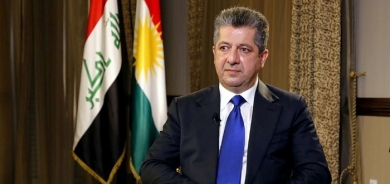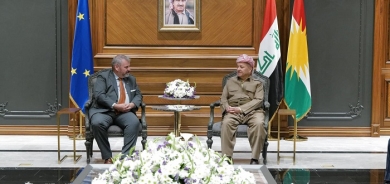Professor Dr.Vladislav B.Sotirović to Gulan: we have to keep in mind that the Cold War is not over yet
December 15, 2020
Exclusive Interviews

Professor Dr. Vladislav B. Sotirović EHU – European Humanities UniversityAcademic Department of Social Sciences Vilnius, Lithuania. His major research interest are theBalkan and Yugoslav studies, nationalism and globalpolitics. He is visiting lecturer at several Europeanuniversities (Erasmus + program). In an interview with our Magazine revolved around the question of Is the Current World Order-What is Called Liberal International Order-Dead? answered our questions as the following:GULAN: Can we speak about the post-Cold War 1.0 World Order as a liberal one?
Professor Dr. Vladislav B. Sotirović: I do not think so. First, we have to keep in mind that the Cold War, in general, is not over yet. There are two Cold Wars after 1945: the Cold War 1.0 until 1989 and the Cold War 2.0 after that up to now. Basically, the USA with its Western NATO's clients did not realize the main task of the Cold War 1.0 according to the design by Zbigniew Brzezinski – destruction and occupation of Russia. Simply, Russia survived the collapse of the Soviet Union and, therefore, we are currently at the time of the Cold War 2.0. Anyway, any kind of the World Order within the framework of the Cold War in international relations cannot be a liberal one – at least according to the academic definition of liberalism and liberal values. Nevertheless, it was clear that the liberal type of the World Order after the collapse of both the USSR and the Warsaw Pact will not work for the very reason that NATO not only survived the Cold War 1.0 but even enlarged its membership since 1999 and at that year became for the first time in its own history directly involved into the act of aggression.
GULAN: Can you more specify your standpoint?
Professor Dr. Vladislav B. Sotirović: As a matter of very fact, regardless of the reality in global politics that the Cold War 1.0 was over in 1989, Washington continued to drive toward getting the status of a global hyperpower at any expense for the rest of the world. The Balkans undoubtedly became the first victim in Europe of the old but esthetically repacked American global imperialism. The US' administration is a key player during the last 27 years of the Balkan crisis caused by the bloody destruction of ex-Yugoslavia in which Washington played a crucial role in three particular historical cases:
1. Only due to the US' administration (more precisely due to the last US' ambassador to Yugoslavia, Warren Zimmermann), a Bosnian-Herzegovinian President Alija Izetbegović (the author of the 1970 Islamic Declaration) rejected the already agreed Lisbon Agreement about a peaceful resolution of the Bosnian crises which was signed by the official representatives of the Serbs, Croats, and Bosniaks in February 1992. Alija Izetbegović was one of those three signatories. The agreement was reached under the auspices of the European Community (the EC, later the European Union) that was represented by the British diplomat Lord Carrington and the Portuguese ambassador José Cutileiro. However, under the US' protection, a Bosnian-Herzegovinian Bosniak-Croat Government declared independence on March 3rd, 1992 which local Serbs decisively opposed. Therefore, two warmongers, Warren Zimmermann and Alija Izetbegović pushed Bosnia-Herzegovina into the civil war which stopped only in November 21st, 1995 by signing the Dayton Accords in Ohio (Slobodan Milošević, Bill Clinton, Alija Izetbegović and Franjo Tuđman).
2. It was exactly the US' administration which crucially blessed the ethnic cleansing of the Serbs from the Republic of Serbian Krayina committed by Croatia's police and army forces (including and neo-Nazi Ustashi formations) in August 4−5th, 1995. For the realization of this criminal operation (under the secret code Storm/Oluja) Washington gave to Zagreb all logistic, political, diplomatic, and military support. As a consequence, around 250,000 Croatia's Serbs left their homes in two days which were quickly occupied by the Croats.
3. South Serbia's Autonomous Province of Kosovo-Metochia was firstly occupied in June 1999 by the NATO/KFOR' forces and later in February 2008 politically separated from its motherland when Albanian-dominated Kosovo's Parliament proclaimed the formal independence primarily as a direct consequence of the Serbophobic policy by the US's administration of President Bill Clinton and his warmongering hawk Secretary of State Madeleine K. Albright. Today, Kosovo, except its northern part, is ethnically cleansed from the Serbs and transformed into a mafia state with a silent blessing by Washington and the rest of the Western states from the NATO and the EU who recognized its quasi-independence.
Here is very important to stress that, basically, during Bill Clinton's administration, the US' foreign policy regarding the Balkans (ex-Yugoslavia) was primarily designed and directed by Madeleine K. Albright who became a chief US' Serbophobe at the very end of the 20th century. Who is Mrs. Albright – the author of Madam Secretary: A Memoir, New York: Talk Miramax Books, 2003, 562 pages. Madeleine K. Albright was born in Czechoslovakia in 1937. She was confirmed as the 64th US Secretary of State from 1997 to 2001. Her career in the US government included positions in the National Security Council and as US ambassador to the United Nations. The highest-ranking female hawk in the history of the US' Government was telling an unforgettable whitewashed story of lies in her memoirs of the US' imperialism at the turn of the 21st century. She was the first woman in the US' history to be appointed to the post of Secretary of State (Minister of Foreign Affairs). For eight years during the first and second Bill Clinton's terms, she succeeded drastically to ruin America's image of a democratic and freedom fighting country mainly due to her direct and crucial involvement in the US-led NATO's aggression on the Federal Republic of Yugoslavia (the FRY) in 1999 composed by Serbia and Montenegro that was the first aggression of this organization in its 50 years long history of the preparation for the invasion of Russia. The aggression lasted for 78 days from March 24th to June 10th, 1999, and was one of the most brutal and barbaric in the modern history of the world breaking all international laws, rules of war, and, most important, the Charter and principles of the UNO. Madeleine K. Albright tried in her memoirs to whitewash her extremely important and even crucial participation in the post-Cold War 1.0 US' policy of imperialism but primarily her focal role in the preparation and conduction of the US/NATO's unprecedented war on the FRY as being one of the most influential policy-makers in her adopted country. The Madam Secretary's memoirs are firstly the story of a woman of great warmongering character with a fascinating talent to lie and whitewash the truth. Her memoirs are surely a valuable contribution to the political history of aggressive diplomacy of the project of the US' global hegemony after the collapse of the USSR at the time of the Cold War 2.0. But who was her mentor?
GULAN: If we are speaking about the US' foreign policy during the last 30 years, the fundamental question is what are the US policy's interests and its implications in Europe?
Professor Dr. Vladislav B. Sotirović: The achievement of a New World Order after 1990 is being tested for some time in Washington. We have to keep in mind that for some first 20 years after the end of the Cold War 1.0, the strongest military and economic power, the leaders of the NATO and the UNO, the initiators of the international peacekeeping missions and negotiations in the regions of „failed states“ in which they provoked the crises and wars, especially at the Balkans, the champions against the international terrorism and crime that was a reaction to their dirty foreign policy of unmasked imperialism and global hegemony, were the USA. Nevertheless, the US' interests in the Balkans cannot be understood apart from a larger picture of the American interests in Europe in general.
Many American scientists and politicians argued that a leader in Europe will either be American or it will not be, since France and Germany (the axis-powers of the EU) were not too strong to take over and Germany was still in the 1990s too preoccupied with the consequences of its reunification (i.e., the absorption of the DDR). However, the recent (on November 11th, 2018) French President Emmanuel Macron's initiative to create a joint European Army shows that probably the Europeans finally became enough matured to maintain security in their own home by themselves but not anymore under the umbrella of the US-led NATO. The question, in essence, is not if, but what kind of leadership the US has and will have in the case that the current post-Cold War 1.0's international relations are not going to be drastically changed? In this respect, the US needs to be aware that the best leadership is the one shared with other partners, in this case with the EU/NATO, more specifically France, Germany, and Britain but, of course, Russia have to be seriously taken into the consideration too. With the involvement of Russia in a common European security system based on equal reciprocity, friendship and partnership, the final aim will be to obtain a common vision and efficient coordination in conflict management, as well as in political and economic cooperation. In such a way, the cases of violent destructions and civil wars, for example on the territory of ex-Yugoslavia, will be avoided for sure.
The US' political analysts are keen to suggest that the American presence in Europe should not be regarded as a competition, but rather as a part of the transatlantic partnership between the two continents, as well as a necessity demonstrated by the sad experience in the former Yugoslavia. According to official Washington, the NATO's intervention in both Bosnia-Herzegovina in 1995 and Kosovo in 1999 (in both cases against the Serbs) under the US' leadership was the only credible action along with many initiatives taken by the international community. However, on the other hand, military intervention is in many cases creating more political and security problems for a longer period. Understandably, the US cannot assist apathetically to the collapse of countries vital to their interest but such a principle is valid to be applied for any great power too. Besides, regional instability only expands, engaging other areas, and creating new confrontations. Thus, the economic support offered to some countries, and the military one offered to others shows that the US formally believe in regional stability as an enforcer of international stability but practically only if such stability is put under the umbrella of Washington's interests and benefits. The case of Kosovo is, probably, the best example of such practice: by bringing formal stability this province of Serbia is put at the same time under the full Western (primarily American) political control and economic exploitation.
GULAN: What is your opinion about the US's role in the post-Cold War 1.0's global security?
Professor Dr. Vladislav B. Sotirović: In supporting NATO's expansion, there is a hesitation in treating all aspirant countries in a non-discriminatory fashion. And that, because interests are more important than global security, can be the reason. The advocates of the „Pax Americana“'s view of the global security would publically say that they are not propagating the US as the savior of the world, or the world's policeman, but they are just the most fervent supporters of global peace and stability. However, in the practice they are working oppositely: as many as conflicts and insecurity issues in the world, there are more chances and practical opportunities for Washington to become the regional policeman and global savior of the order. In their relationship with other NATO countries, the USA regards the process of integration in the Euro-Atlantic space (i.e., the area of the US' control and administration) as a two-way street in which each partner needs to accomplish its tasks. In addition to those is, of course, the geostrategic position (Turkey instead of Greece, for instance, in the 1974 Cyprus crisis) and short, medium, and long-term declarative promises like the economic gratification of security which can, in the end, to be turned to its opposite side. For instance, the US' offering military, political and financial assistance to the countries of East-Central and South-East Europe as a mean to build up their security shield against „aggressive“ Russia can be easily transformed into their very insecure reality coming from the US' imperialistic policy toward Russia as there were already the cases with Georgia in 2008 and Ukraine in 2014 as the „Pax Americana“'s approach in international relations is as its countereffect just provoking the Russian (and Chinese) counteraction in enhancing its own nuclear and other military potentials as Vladimir Putin exactly stressed during his electoral campaigns.
GULAN What is the US' geopolitical strategy in global politics and international relations?
Professor Dr. Vladislav B. Sotirović: Henry Kissinger – a Vietnam War time the US' Secretary of State – summarized the post-Cold War 1.0's international relations from the American geopolitical viewpoint as such:
„Geopolitically, America is an island off the shores of the large landmass of Eurasia, whose resources and population far exceed those of the United States. The domination by a single power of either of Eurasia's two principal spheres – Europe or Asia – remains a good definition of strategic danger for America, Cold War or no Cold War. For such a grouping would have the capacity to outstrip America economically and, in the end, militarily“ [John Rees, Imperialism and Resistance, New York−London: Routledge Taylor & Francis Group, 2006, 18].
It is not surprising that in the 1990s there were raised voices in Washington that required that the US has to find a way of dominating Eurasia at any reasonable cost. The US' neocon warmongering hawks, like Zbigniew Brzezinski, recognized that the area of the enlarged Middle East (with the Balkans, North Africa, and Central Asia) is from the strategical viewpoint, economically, ideologically and above all geopolitically at the center of the Eurasian issue. However, the US' neocon hawks' much wider global geopolitical aims which were coming closer to the aim to continue domination in the Middle East were launched during Bill Clinton's presidency as a result of a wider shift in the American foreign policy's profile led by Secretary of State Madeleine K. Albright (“Madam Secretary”) and her extremely Russophobic mentor Zbigniew Brzezinski (known as Zbig).
GULAN: What are the links between Zbigniew Brzezinski and Madeleine Albright?
Professor Dr. Vladislav B. Sotirović: A Warsaw-born Zbig (1928−2017) was a focal personality in the US' foreign policy's elite establishment since President Jimmy Carter's administration in which he was a National Security Advisor. During Ronald Reagan's administration, Zbig was the main mediator between Washington and its clients in Afghanistan – the anti-Soviet Taliban forces and Osama bin-Laden with whom Zbig has several common photos (in 1979) on which he is training Osama to operate with just donated American guns to fight the Soviets. Further, Zbig has a great influence on the first Bill Clinton administration and he was at the same time an early advocate of NATO's eastward expansion (started in 1999). It is assumed that it was exactly Zbig who was instrumental in getting the US President Bill Clinton to commit himself to this course of American imperialism in 1994. Furthermore, Brzezinski's influence on the US' foreign policy became stronger during the second Clinton administration through Secretary of State Madeleine K. Albright – his former pupil at Columbia University. It is worth noting that Albright was working under his supervision in Carter's administration.
If we have to summarize Zbig's chief imperatives of the US' imperialistic global policy and geostrategy of the making America world's hegemon, they are going to be as follows:
1. To prevent collusion and maintain security among the US' vassal states (the NATO/EU).
2. To keep tributaries pliant and protected.
3. To keep the barbarians (the Russians and their supporters) from coming together.
4. To consolidate and perpetuate the prevailing geopolitical pluralism in Eurasia by manipulation to prevent the emergence of a hostile coalition that could finally attempt to challenge the US' supremacy in the world.
5. Those that must be divided and eventually ruled are Germany, Russia, Japan, Iran, and China.
The American direct and infamous participation in the destruction of ex-Yugoslavia in 1991−1995 followed by the 1998−1999 Kosovo's War can be understood, therefore, as the steps in the realization of Zbig's geopolitical strategy of making America global hegemon. The US-led bombing of Serbia and Montenegro from March to June 1999 (78 days) was carried out by enlarged NATO and the UNO was only called at the end to sanctify the resulting colonial policy of Washington. The aggression on Serbia and Montenegro was formally justified by a reference to the TV-show plight of Kosovo's Albanians, developing at the same time the new doctrine of „humanitarian imperialism“. We have to keep in mind on this place that the Yugoslav wars in the 1990s were fought in a geographical area which is the crucial courtyard of the Eurasian continent that is as such opening a direct way to the ex-Soviet republics on the shores of the Caspian and the energy sources they control. Nevertheless, Kosovo's War became for the US the genuine precursor of its later invasion of Iraq in 2003.
„Madam Secretary“ was a firm advocate of bombing Serbia and Serbs in Washington primarily due to the direct influence by notorious Russophobe Zbig who saw the Balkan Serbs as „little Russians“ and the Balkan wars of the destruction of ex-Yugoslavia as a testing ground for the US' policy throughout the whole Caspian and Central Asian area. However, besides, being an advocate for the US' oil companies wishing to establish their business on the territory of the ex-Soviet Union in the Caucasus and Central Asia, Zbig regarded the American political and geostrategic supremacy in this region as a crucial aim of the US' foreign policy in the 1990s. To accomplish his aim, among other manipulations and instruments, Zbig championed the American support to the Islamic Pakistan, the Taliban Afghanistan (till 9/11), and the Islamic resurgence in Saudi Arabia and even Iran. Nevertheless, it has to be stressed that different from all other American warmongers and imperialistic hawks, Zbig favors the alliance with the Shia Islamic Republic of Iran.
GULAN : What is the multidimensional aspect of global security?
Professor Dr. Vladislav B. Sotirović: Globalization, stability, and security indeed offer to the countries a greater capacity to cooperate and focus on the economic prosperity of its citizens but in practice, this particularly means much more important businesses and more money for the US' economy and citizens. Today, security has multidimensional aspects. If during the Cold War 1.0 security only had a military-political component, today it has gained a new aspect – the economic one. The non-military aspects of security comprise everything from macroeconomic stability to environmental health. The proponents of the US' global hegemony will all the time argue that where there is harmony (established by the US) and well-being the chances of conflicts to erupt are smaller and the gain is exclusively financial and economic (primarily for the US).
There is, of course, a combination of interest per se and their consequences. To illustrate, the case of North Macedonia could be interesting. The ex-Yugoslav republic of North Macedonia at the first glance benefits from the US' military presence on her territory since 1991 as it is a geostrategic spot in the Balkans of the highest importance. As a matter of fact, this military presence maintained Macedonia's economic level at a higher standard than some of the other countries in the area up to 2001, even though it was still the poorest of the former Yugoslav six republics affected by two economic embargos by Greece in 1991−1993. North Macedonia was illustrated till 2001, especially by the Western media, as being a success story in conflict prevention and peace maintenance primarily due to the presence of the US/NATO's military troops. However, in 2001 erupted inter-ethnic conflict between the Slavic Macedonians and the local Albanians (supported by the Kosovo Liberation Army) what brought the question of the US/NATO's efficiency in the region.
NATO's eastward expansion is a particular story of Zbig's geostrategic designs against his eternal enemy – Russia. It is a fact that just before the NATO's aggression on Serbia and Montenegro in 1999, this military organization accepted as the member states three East-Central European countries: Poland, Hungary, and the Czech Republic (the next eastward enlargement was in 2004). Therefore, the southern flank of the NATO between Hungary and Greece became now interrupted only by the territory of ex-Yugoslavia. Subsequently, such a situation gave NATO a considerable strategic interest in controlling the Balkans where the Serbs were the most numerous and geostrategically most important nation. However, as a direct effect of NATO's eastward enlargement, the Iron Curtain was moved further to the east and closer to Russia's borders with all spectrum of the expected and unexpected consequences of such anti-Russian Drang nach Osten. Now, the Iron Curtain, once dividing Germany, came in 1999 to run down the eastern borders of Poland, the Czech Republic, and Hungary, ending on the state-borders of the ex-Yugoslav republics, now independent states. The crux of the matter is that a decade-long process of NATO's eastward enlargement became at the beginning of 1999 blocked in the Balkans by the Serbs – the only ex-Yugoslav nation firmly opposing NATO's membership. Subsequently, it was exactly Washington to assume the role of leading NATO to the new anti-Russian front and borders. That was the crucial reason why the Serbs had to be bombed in 1999 and Kosovo occupied by the US-led NATO's troops in the form of the UNO KFOR. What regards this issue, both Zbig and „Madam Secretary“ were clearly speaking through the mouth of the US' President Bill Clinton: the stability (the US' control) in the Balkans could only be established if the EU and the USA do for this region what it was done for Europe after WWII and Central Europe after the Cold War 1.0 – occupation and economic-financial exploitation within the formal framework of NATO's and EU' (the USA) enlargement.
GULAN: What are your predictions of global security?
Professor Dr. Vladislav B. Sotirović: The brutal expansion of NATO is very visible since 1999 and even expected if we are taking into consideration the final aims of the US' foreign policy in Eurasia framed by a notorious foreign policy gangster – Zbigniew Brzezinski. As a consequence, the EU is going to continue to be America's main colonial partner in NATO's preparations for the war of aggression against Russia (currently via Belarus) and most probably at the same time China. Subsequently, there will be a need for much work and a common will to overcome violence, injustice, and suffering to achieve a global security without the hegemonic dominance by any superpower. Only in such a way the true liberal World Order can be established.















